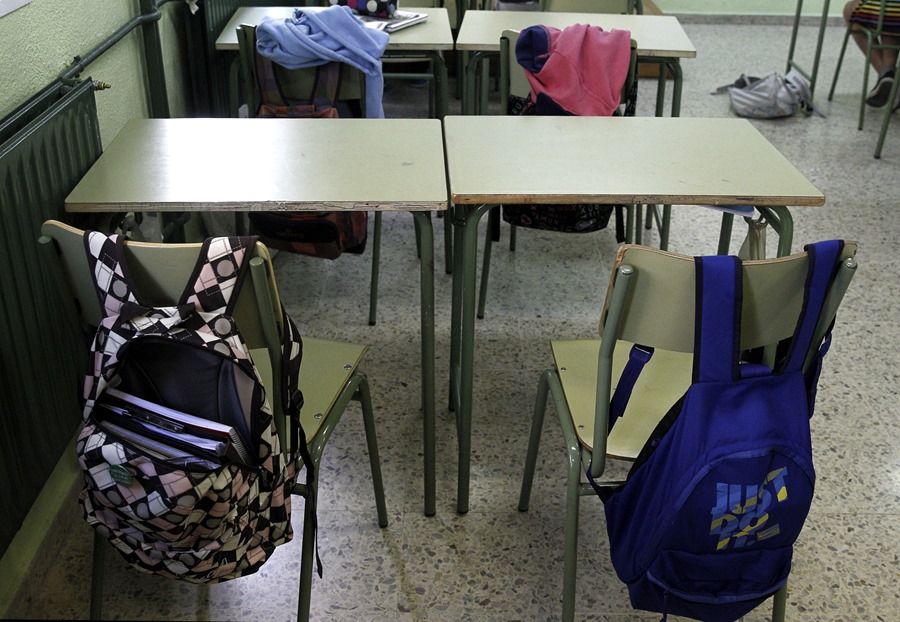Marina Segura Ramos |
Madrid (EFE) have a free education from birth to doctorate.
Election after election, whether regional, municipal or general, the parties agree on the great promises: more investment, improvement of educational infrastructure -construction, renovation or expansion of centers-; the reduction of the ratios to facilitate a more individualized attention; the promotion of vocational training and the brake on dropout and bullying, among others.
However, a schism opens when political forces address issues such as the educational agreement and bilingualism in the autonomous communities where there are two official languages.

If Cs achieve victory in any of the ten communities in contention or govern in a coalition with weight to influence, one of his proposals is to extend the age of compulsory education to 18 years, because he believes that an extra year in high school or FP contributes to reduce early school leaving and the training gap.
Like the PP, Ciudadanos is also committed to a single university entrance exam for all of Spain and a loan system similar to the one that exists in the United Kingdom, at zero interest.
The electoral program of Unidas Podemos proposes a free education from birth to a doctorate and a moratorium on new educational concerts and licenses for private universities, as well as a complete ban on illegal co-payments in centers subsidized with public funds.
What happens if the PP wins?
Apart from the content of its electoral program for the 28M, the party led by Alberto Núñez Feijoó has already announced that it will repeal the last educational reform of the Socialist Government because it believes that it is contrary to the culture of effort and merit. For different reasons, it has also advanced that it will abolish the recently approved University System Law (LOSU).

One of its flags within the educational field is the defense of the right to education in Spanish in autonomous communities such as Catalonia and the freedom of parents to choose the educational center where they want their children to study.
Historically, it has defended the existence of concerted education, implemented in Spain in 1985.
Vocational Training, a bet for all parties
Like its main socialist opponent, the PP is also committed to increasing Vocational Training places, one of the “star” issues of the current legislature of Pedro Sánchez, some teachings that for the first time have exceeded one million students last year enrolled.
In the last two Councils of Ministers, more than 1,800 million euros have been approved for Vocational Training -destined both to vocational training in the education system and to employment-, which in the words of the Minister of Education and Vocational Training, Pilar Alegría, is a safe way to reduce youth unemployment, increase the competitiveness of companies and reactivate the social elevator through education.
Another of his bets, which the rest of the parties replicate, is to move towards free schooling for 0-3 years and the creation of more public places, although there is division on this issue since parties like the PP and Cs do not agree in promoting not only the public network but also the concerted network in this first cycle of Infant, whose presence is today very relevant in most of the CCAAs.
Although in the electoral program for the 28M of the PSOE the educational concerts are not mentioned, in its last educational law it already stops its extension and prohibits that the aid can be received by centers that separate by sex.
In the event that Vox proves decisive in the formation of regional governments, one of its measures is that the powers of Education, together with Health, Justice and Security, be returned to the State, “limiting as much as possible the autonomous legislative capacity, as a step prior to the creation of a unitary state, administratively decentralized”.
Freedom of choice of educational center
In addition, it proposes to approve a “long-lasting National Education Law that establishes common contents”; “Remove from the classroom any person or association that intends to offer affective-sexual content without the knowledge and acceptance by the parents” and “protect the free choice of center at all levels through the school check so that families choose the educational model they want, without their economic or social situation being an impediment to it”.
As well as guaranteeing the right “to be educated in Spanish throughout the national territory and the duty of all Spaniards to know the common language.”






